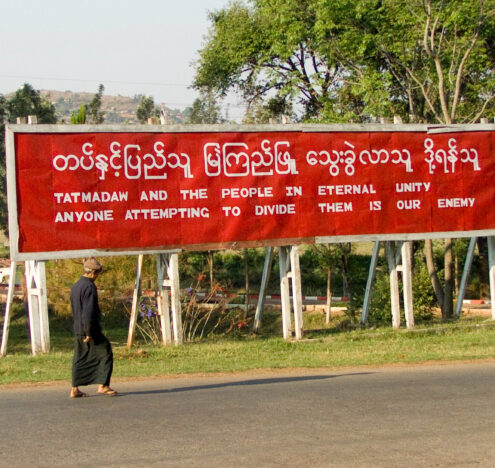As domestic far-right extremism continues to grow as a threat in the United States, a troubling recent trend is the upsurge of extreme misogyny. While misogyny is the feeling of resentment or unbiased hatred towards women, extreme misogyny includes actively advocating for violence against women. Often, extreme misogynistic ideology has at least some overlap with the far-right.
White supremacist movements and anti-government extremism have seen a resurgence, especially during and after the recent COVID-19 pandemic lockdowns. A large part of these extremist ideas spread online. There are many communities across social media platforms, such as Instagram, Facebook, TikTok, and Telegram, where specific hashtags are used to find, support, and grow extremist communities.
So to understand the role of misogyny and the way these far-right and white supremacist groups use misogyny as a gateway to the far-right, one of the first places to start is online. The loosely connected ideology of the manosphere is the nebulous home to the movements. This is an umbrella term for a group of misogynistic online communities, including involuntary celibates (incels), pick-up artists (PUAs), and Men’s Rights Activists (MRA). While not all men posting within the manosphere support far-right ideology, for many men — and women — it is an important part of radicalization pathways to the far right and white supremacy.
Misogyny and Men
Men involved in manosphere communities may not describe themselves as extremist, but the online discourse points to far-right extremism and extreme misogyny. One such example is the incel community. Incels are men who believe they have a right to sexual and romantic relationships and blame society for their lack of these relationships. While at first sight such a belief may seem to be relegated to the private sphere, after all the men feel inadequate within their romantic and sexual lives: in essence a private relationship. Yet, there have been plenty of examples of misogynist violence directed outward towards women. In 2014, a man killed six people and injured fourteen, during the Isla Vista attacks. The shooter referred to this as “the day of retribution,” and did so because he blamed women and attractive men for his situation. In 2018, a man in Toronto, inspired by the Isla Vista attacks, killed ten and injured sixteen people by driving his van through a populated area in the business center of the city. Both men were anti-feminist and misogynistic and they are now revered within the incel community. People have made shirts blazoned with their faces and created a mock film trailer from clips of the Isla Vista killer’s videos.
While not all men posting within the manosphere support far-right ideology, for many men — and women — it is an important part of radicalization pathways to the far right and white supremacy.
The incel community often discusses the notion of “taking the red pill.” This analogy has its roots in The Matrix, the 1999 science fiction movie, in which the main character gets to choose between taking the red pill or the blue pill. The red pill refers to seeing the uncomfortable truth about society, while the blue pill refers to being blissfully ignorant. This also means that it depends on the “giver” of the red pill as to what the “uncomfortable truth” entails. In the context of the manosphere and incel community, it means men that have “taken the red pill” believe that they hold the truth, that they are better than the rest of society — those who stick with the blue pill — and they blame feminism for their lack of sexual and romantic relationships.
Misogyny and Women
There is an unexpected — and often unspoken — association between the incel community and the manosphere in a broader sense, and some white, female influencers. Social media is rife with images of young, beautiful women, promoting skincare routines, amazon shopping lists, recipes, and white nationalism. These women refer to themselves as “tradwives,” a portmanteau of traditional and wife. Now, the tradwife aesthetic has evolved from a reddit forum, the “red pill women” and has been picked up by many influencers. This forum has a set of distinct rules, one of which clearly states that they are anti-feminist, they post anti-feminist content, and, “anybody stopping in to weight-in with the feminists perspective will be shown the door, as it is off topic.”
In general, the trad community is all about living a traditional life, homesteading, taking care of the husband, and raising kids. Ideally, tradwives would like to revert to the traditional role patterns from the 1950s. At first sight, this can seem to be innocuous, as these women just want to live their lives the way they want to, and revert to a time in which “everything was better” — although this leads us to ask, for whom? Tradwives claim that feminism has set women back, and that women nowadays need to juggle their careers, relationships, children, and so much more.
But this movement has a darker side. Women within the trad movement, particularly the exemplars — those upheld as icons — have followings on social media. When these women post make-up routines or discuss clothing, women solely interested in their lifestyle content may follow them. But subtly layered into some of the posts, sometimes via hashtags, are references to far-right and white nationalist language and ideology. As viewers click through baking videos, they may find themselves surrounded by a mythicized nostalgia of racist fiction akin to making America great “again.”
That the trad community appeals to an image of a glorified era of the 1950s and 1960s, has a violent underbelly. This was the time of segregation in the United States, and the “tradition” they refer to has nativist connotations: they glorify the white experience of this violently racist time. Furthermore, the narrative that traditional gender roles meant women stayed home whitewashes the experience of the many, mostly non-white women who already had to work outside of the house in the 1950s and 1960s. Evoking this bygone era folds within it dangerous racist beliefs about what makes for a good, healthy family and society that elevates white, heteronormative, traditional role patterns.
Women have long been supporters, contributors, and active participants in the far-right and white nationalism. At the same time, women’s influence on and involvement with white nationalism and the far right has often been negated or neglected. Due to their online influence, and their implicit or explicit connection to the far-right, we can no longer see these women as comprising a mere subculture. Instead, these women, and the power they hold within the tradwife community, need to be taken seriously.
While the expressions differ between the men involved with the manosphere and tradwives, they share key ideological overlaps. Both are worried about the move away from traditional role patterns, are anti-feminist, and promote ideal versions of a traditional gender binary, with perceived feminine characteristics attributed to women, and perceived masculine attributes attributed to men. Both include a sexualized version of femininity that emphasizes submission to men. And both communities place the blame for their woes and on contemporary sexual relations and changing gender relations in society.
The impact of these cultural shifts does not stay at home or online. At times, the incel community calls for violent action to overthrow existing feminist structures. And the trad community’s deft use of social media makes them effective recruiters to the far-right. Slipping such fringe beliefs into mainstream discourse continues to shift the political conversation in ways that can have terrifying tangible effects.





















